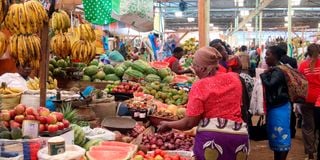Premium
Poll: 70pc of Kenyans ‘can’t make ends meet’

Kenyans buy foodstuff in Nyeri town. A majority of Kenyans are in severe financial distress or are struggling to make ends meet.
What you need to know:
- A further 41 per cent have reduced their expenditure on non-essential items, while 18 per cent have taken out loans to bridge the gap.
- In terms of age groups, young people between the ages of 18 and 26 and those over 55 are worst hit at 77 percent.
- Most females, 52 percent, rely on friends and family for support.
A majority of Kenyans are in severe financial distress or are struggling to make ends meet, a new poll shows.
The poll by Infotrak research firm indicates that out of the 73 per cent affected Kenyans, 18 per cent are in severe financial distress while 55 per cent are struggling to make ends meet.
According to the survey, conducted between December 18 and 19, 2023, only five per cent of Kenyans are living comfortably amid soaring cost of living and increased tax burden.
Mr Johvine Wanyingo, Infotrak research manager, on Monday said the poll indicated that the current economic hardship has forced 45 per cent of Kenyans to engage in side hustles to supplement their income.
Another 41 per cent have reduced their expenditure on non-essentials while 18 per cent have taken out loans to fill the gap.
The resultant effects of the economic challenges have seen 48 per cent of Kenyans suffer increased stress and anxiety, 32 per cent strain on relationships, 21 per cent physical health issues and 18 per cent mental health issues.
North Eastern, at 78 per cent, is the most affected region followed by Coast at 76 per cent, Central at 74 per cent and Rift Valley at 73 per cent.
In terms of age group, young people between ages 18 and 26 years and those above 55 years are worst hit at 77 per cent.
According to the survey, which involved 1,500 respondents, Kenyans have devised coping mechanisms— including seeking additional employment or income sources at 45 per cent, cutting back on non-essential expenses, 41 per cent, taking out loans at 18 per cent, and borrowing money from friends at 15 per cent, among other ways.
In terms of gender, most men, at 47 per cent, are seeking additional employment or income sources and 44 per cent are cutting back on non-essential expenses while most women, at 21 per cent, are taking out loans.
Family and friends, at 48 per cent, have been most helpful, followed by government assistance programmes at 24 per cent, NGOs at 19 per cent, online financial management resources at 12 per cent, and employer assistance programmes at 10 per cent.
Most females, at 52 per cent, depend on friends and family for support.

Infotrak Research Manager Johvine Wanyingo addressing journalists during the infotak voice of the people poll release at their offices in Nairobi on January 22, 2024.
In Western and Eastern regions, most people depend on family and friends, while in Coast, household are relying on government programmes and NGOs.
The future outlook, according to poll, is bleak— with 48 per cent of Kenyans saying the cost of living is likely to increase.
Others see spikes in school fees (67 per cent), cost of energy (51 per cent), unemployment (56 per cent), cost of fertiliser (40 per cent ) and dollar exchange rate (52 per cent).
In the poll, Kenyans have identified specific areas that need more support to cope with the hard economic situations this year.
A total of 26 per cent say there is need to reduce the cost of living, 13 per cent want a cut in fuel costs and creation employment opportunities.
Some 12 per cent want the William Ruto-led administration to reduce taxation, six per cent are yearning for agricultural incentives and cheap loans, while others want the government to ensure food security and improved health services countrywide.
The poll has +/-2.53 margin of error and 95 per cent confidence level.





